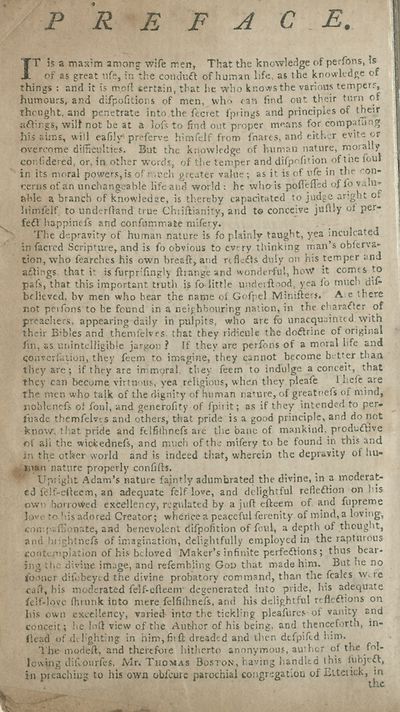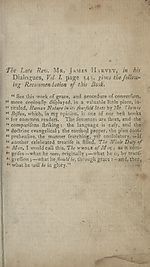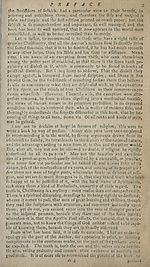Download files
Complete book:
Individual page:
Thumbnail gallery: Grid view | List view

P R
E F A C E.
IT is a maxim among wife men. That the knowledge of perfons, is
of as great nfe, in the conduft of human life as the knowledge of
things : and it is mod terrain, that he who knows the various tempers,
humours, and difpofitions of men, who <an find out their turn of
thought, and penetrate into the fecret fprings and principles of their
afiir.gs, will not he at a lofs to find out proper means for companing
his aims, will eafily'preferve himfelf from fnarts, and either evite or
overoome difficulties. But the knowledge of human nature, morally
confidered, or. in other words, of the temper and difpnfition ofthe foul
in its moral powers, is of much greater value ; as it is of ofe in the con¬
cerns of an unchangeable life and world: he who is pofleffed of fo valu¬
able a branch of knowledee, is thereby capacitated to judge aright o.
himfelf to underfland true Chiiflianity, and to conceive jufUy ot per-
feft happinefs and confummate mifet y.
The depravity of human nature is fo plainly taught, yea inculcated
in facrcd Scripture, and is fo obvious to ev> ry thinking man’s obferva-
tion, who fearches his own bread, and rtfLfis duly on his temper and
adfings that it is furprfingly ftiangeand wonderful, hoW it comes to
pafs, that this important truth is fo little underftood, yea fo much dif-
brlieved, bv men who hear the name of Gofpel Minifters. A e there
not peifons to he found in a neighbouring nation, in the character of
preachers, appearing daily in pulpits, who are fo unacquainted with
their B’bies and themfelves that they ridicule the dodlrine of original
fin, as ut,intelligible jargon ? If they are perfons of a moral life and
converfalion, they feem to imagine, they cannot become better than
they are; if they are immoral they feem to indulge a conceit, that
they can become virtuous, yea religious, when they pieafe I hefe are
the men who talk of the dignity of human nature, of greatnefs of mind,
jioblenefs of foul, and generofity of fpitit; as if they intended to per-
i'uade thcmfelvcs and others, that pride is a good principle, and do not
know, that pride and fclfithnefs arc the banc of mankind, productive
nl ali tire wickednefs, and much of the mifery to be found in this and
in the other world and is indeed that, wherein the depravity of hu¬
man nature properly confifis.
Upright Adam’s nature family adumbrated the divine, in a moderat¬
ed felf-efleem, an adequate felf love, and delightful reflection on Ids
own borrowed excellency, regulated by a juft efteem of and fupreme
Jove to his adored Creator; whence a peaceful ferenity of mind, a loving,
compafiionate, and benevolent difpofition of foul, a depth of thought,
and hiightneft of imagination, delightfully employed in the rapturous
couti mplation of his beloved Maker’s infinite perfections ; thus bear¬
ing tire divine image, and refembling God that made h:m. But he no
looner difobeytd the divine probatory command, than the feales w. re
cait, his moderated fdf-efteem degenerated into pride, his adequate
felf-lovo fluunk into mere felfilhnefs, and his delightful reflections on
his own excellency, varied into the ticking pleafures of vanity and
conceit; he loft view of the Author of his being, and thenceforth, in-
Arad of ds fighting in him, fit ft dreaded and then dtfpiftd him.
The modeft, and therefote hitherto anonymous, author of the fol¬
lowing diftourfes, Mr. Thomas Boston, having handled this fubjeCt,
in pleaching to his own obi'euic parochial congregation of Bltciick, in
E F A C E.
IT is a maxim among wife men. That the knowledge of perfons, is
of as great nfe, in the conduft of human life as the knowledge of
things : and it is mod terrain, that he who knows the various tempers,
humours, and difpofitions of men, who <an find out their turn of
thought, and penetrate into the fecret fprings and principles of their
afiir.gs, will not he at a lofs to find out proper means for companing
his aims, will eafily'preferve himfelf from fnarts, and either evite or
overoome difficulties. But the knowledge of human nature, morally
confidered, or. in other words, of the temper and difpnfition ofthe foul
in its moral powers, is of much greater value ; as it is of ofe in the con¬
cerns of an unchangeable life and world: he who is pofleffed of fo valu¬
able a branch of knowledee, is thereby capacitated to judge aright o.
himfelf to underfland true Chiiflianity, and to conceive jufUy ot per-
feft happinefs and confummate mifet y.
The depravity of human nature is fo plainly taught, yea inculcated
in facrcd Scripture, and is fo obvious to ev> ry thinking man’s obferva-
tion, who fearches his own bread, and rtfLfis duly on his temper and
adfings that it is furprfingly ftiangeand wonderful, hoW it comes to
pafs, that this important truth is fo little underftood, yea fo much dif-
brlieved, bv men who hear the name of Gofpel Minifters. A e there
not peifons to he found in a neighbouring nation, in the character of
preachers, appearing daily in pulpits, who are fo unacquainted with
their B’bies and themfelves that they ridicule the dodlrine of original
fin, as ut,intelligible jargon ? If they are perfons of a moral life and
converfalion, they feem to imagine, they cannot become better than
they are; if they are immoral they feem to indulge a conceit, that
they can become virtuous, yea religious, when they pieafe I hefe are
the men who talk of the dignity of human nature, of greatnefs of mind,
jioblenefs of foul, and generofity of fpitit; as if they intended to per-
i'uade thcmfelvcs and others, that pride is a good principle, and do not
know, that pride and fclfithnefs arc the banc of mankind, productive
nl ali tire wickednefs, and much of the mifery to be found in this and
in the other world and is indeed that, wherein the depravity of hu¬
man nature properly confifis.
Upright Adam’s nature family adumbrated the divine, in a moderat¬
ed felf-efleem, an adequate felf love, and delightful reflection on Ids
own borrowed excellency, regulated by a juft efteem of and fupreme
Jove to his adored Creator; whence a peaceful ferenity of mind, a loving,
compafiionate, and benevolent difpofition of foul, a depth of thought,
and hiightneft of imagination, delightfully employed in the rapturous
couti mplation of his beloved Maker’s infinite perfections ; thus bear¬
ing tire divine image, and refembling God that made h:m. But he no
looner difobeytd the divine probatory command, than the feales w. re
cait, his moderated fdf-efteem degenerated into pride, his adequate
felf-lovo fluunk into mere felfilhnefs, and his delightful reflections on
his own excellency, varied into the ticking pleafures of vanity and
conceit; he loft view of the Author of his being, and thenceforth, in-
Arad of ds fighting in him, fit ft dreaded and then dtfpiftd him.
The modeft, and therefote hitherto anonymous, author of the fol¬
lowing diftourfes, Mr. Thomas Boston, having handled this fubjeCt,
in pleaching to his own obi'euic parochial congregation of Bltciick, in
Set display mode to:
![]() Universal Viewer |
Universal Viewer | ![]() Mirador |
Large image | Transcription
Mirador |
Large image | Transcription
| Antiquarian books of Scotland > Religion & morality > Human nature in its fourfold state > (8) |
|---|
| Permanent URL | https://digital.nls.uk/107541242 |
|---|
| Description | Thousands of printed books from the Antiquarian Books of Scotland collection which dates from 1641 to the 1980s. The collection consists of 14,800 books which were published in Scotland or have a Scottish connection, e.g. through the author, printer or owner. Subjects covered include sport, education, diseases, adventure, occupations, Jacobites, politics and religion. Among the 29 languages represented are English, Gaelic, Italian, French, Russian and Swedish. |
|---|

